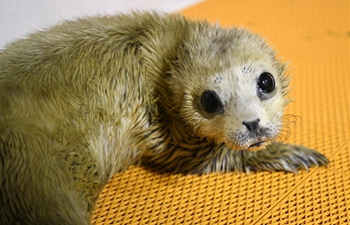CHICAGO, April 3 (Xinhua) -- A curled-up cat, a tail-wagging dog, a chirping parakeet or a serene goldfish, may help older adults cope with mental and physical health issues, a national poll posted on the website of the University of Michigan (UM) on Wednesday showed.
The National Poll on Healthy Aging results are based on responses from a nationally representative sample of 2,051 adults aged 50 to 80 who answered a wide range of questions online.
In all, 55 percent of adults have a pet, and more than half of those have multiple pets. More than three-quarters of pet owners say their animals reduce their stress, and nearly as many say pets give them a sense of purpose. But 18 percent also said having a pet or pets puts a strain on their budget.
Two-thirds of all pet owners, and 78 percent of dog owners, said their pet helps them be physically active, according to the new findings from the national poll, conducted by the University of Michigan Institute for Healthcare Policy and Innovation.
For those who reported that their health was fair or poor, pet ownership appeared to offer even more benefits. More than 70 percent of these older adults said their pet helps them cope with physical or emotional symptoms, and 46 percent said their pets help take their mind off of pain.
"We have long known that pets are a common and naturally occurring source of support," said Cathleen Connell, a professor at the UM School of Public Health who has studied the role of companion animals in older adults' lives.
"Although the benefits of pets are significant, social connections and activities with friends and family are also key to quality of life across the lifespan. Helping older adults find low-cost ways to support pet ownership while not sacrificing other important relationships and priorities is an investment in overall mental and physical health."
While pets come with benefits, they can also bring concerns, and some people may even put their animals' needs ahead of their own health, the poll finds.
"More activity, through dog walking or other aspects of pet care, is almost always a good thing for older adults. But the risk of falls is real for many, and 6 percent of those in our poll said they had fallen or injured themselves due to a pet," said poll director Preeti Malani. "At the same time, given the importance of pets to many people, the loss of a pet can deal a very real psychological blow that providers, family and friends should be attuned to."












